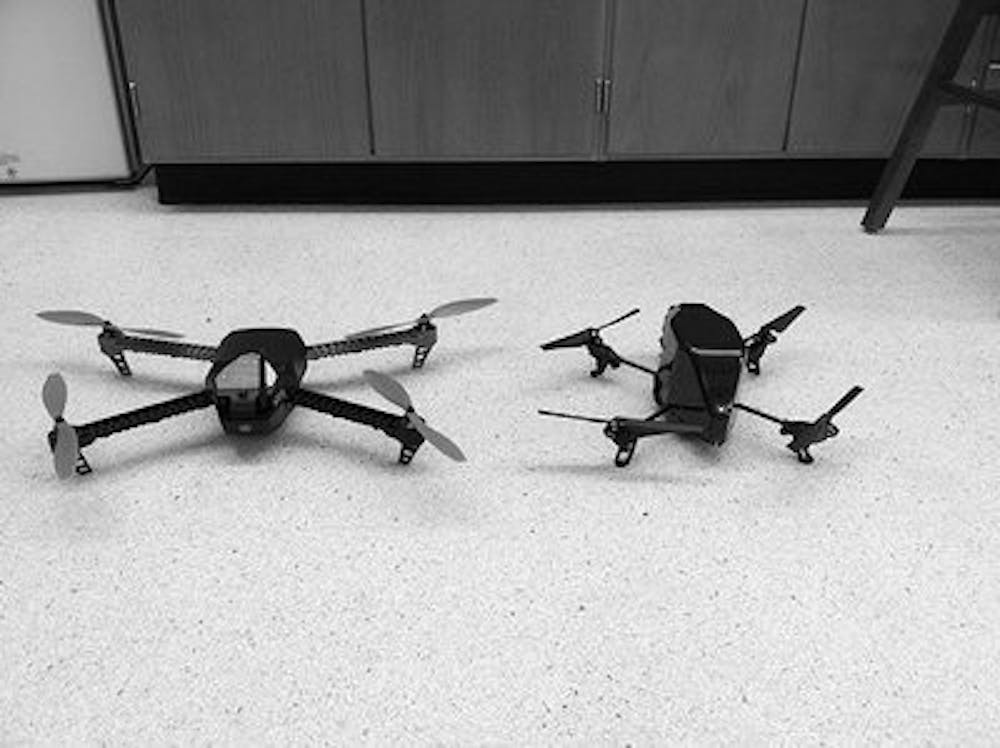In the near future, when an order is placed online, the customer may no longer receive the package through the traditional United States Postal Service, ground or air delivery. Instead, an unmanned drone will deliver the package.
Chase Murray, associate professor in the department of industrial and systems engineering, is part of a research group at Auburn that has developed a plan to address changes in the material handling and logistics industry. These changes could allow for packages to be delivered by unmanned drones or unmanned aerial vehicles (UAVs) within two years.
"(Technology's) heading that way," Murray said. "However, we are still a ways off. Right now, it's illegal to fly UAVs for commercial purposes in the United States. The Federal Aviation Administration will not allow it, but it is supposed to provide Congress with guidelines for the use of UAVs in 2015."
Murray said the idea came about after seeing an episode of 60 Minutes, which did a feature on Amazon. The episode revealed Amazon had UAVs and were planning to use them to start delivering packages.
"This sent shockwaves through the industry because of all the manpower (drones) could save," Murray said. "Instead of a person flying a plane, its an unmanned aircraft."
Amazon uses an eight-rotor octocopter, which is outfitted with a lunchbox-type carrier that sits below the UAV. The carrier can hold packages weighing up to six pounds. The octocopter will fly to the driveway, land, release the package and then fly away, Murray said.
The one major drawback right now is the UAV's battery life, which only allows for the Amazon's UAVs to travel within a 10 mile radius, according to Murray.
"That's very limited," Murray said. "The solution would be to try and increase battery capacity. However, that comes with a tradeoff. A better battery is probably heavier which may take away from the flight endurance of the UAV."
Murray teamed up with three other Auburn professors in order to workout the technical challenges.
David Bevly, professor in mechanical engineering, is responsible for working with the GPS and trying to find alternatives to GPS navigation.
"The UAVs rely on GPS, which is not a very reliable source," Murray said. "More work needs to be done in order for the drone to find its exact destination."
According to Murray, another drawback is the chance they may collide with passenger airplanes. Saad Biaz, professor in computer science and software engineering, is working on collision avoidance technology.
"We have a fleet of small UAVs that are able to fly in the same airspace," Murray said. "They avoid collisions by communicating with the ground control station that directs traffic."
Kevin Gue, associate professor in the department of industrial and systems engineering, works on a logistics plan which involves the process of getting goods from the manufacturer to the customer.
Gue said the idea came about after he met with Henrik Christensen of Georgia Tech at a Material Handling Industry (MHI) meeting. It was at the meeting Christensen suggested the materials handling and logistics industry undertake a plan similar to the one he had orchestrated for the robotics industry.
"It's from that roadmap that he came up with the idea of advancing technologies for delivery by UAVs," Murray said.
Gue utilized his research expertise in warehousing, material handling and order fulfillment to examine how upcoming technologies can have a direct impact on companies now, as well as 10 to 15 years in the future.
With companies like Amazon pioneering the use of UAVs through package delivery, Gue said he believes the industry will undergo a change.
"In robotics in particular, we're going to see a revolution in the next three to 10 years that I think is going to be shocking and exciting at the same time," Gue said. "We're going to have robots doing things that we never thought could be done. The technology is pushing us."
Do you like this story? The Plainsman doesn't accept money from tuition or student fees, and we don't charge a subscription fee. But you can donate to support The Plainsman.





